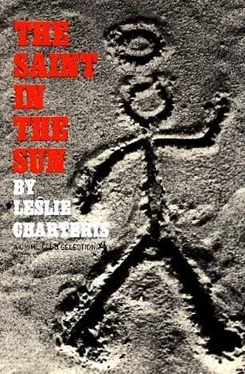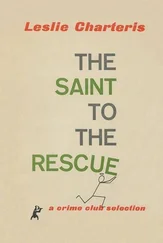Leslie Charteris
The Saint in the Sun
To:
JOHN PADDY CARSTAIRS
with thanks for many nice things done
for the Saint, and especially for
suggesting this title.
All of the characters in this book are
fictitious, and any resemblance to actual
persons, living or dead, is purely
coincidental.
1. CANNES: The Better Mousetrap
Until his unfortunate accident, Mr. Daniel Tench, in spite of having been christened with such an unglamorous name (though he had used others) had managed to lead what some people would consider quite a glamorous life. Born in a caravan on an English fairground, he had grown up with a traveling circus, and spent several years as a merely second-rate acrobat, by Ringling standards, before he graduated to become one of the most successful jewel thieves who ever operated in Europe.
A few small but profitable experiments during his last season under canvas had shown him that the limited athletic gifts which would never get him billing at Madison Square Garden were more than adequate for making illegal entries by various improbable routes; and when a neat second-story job in Deauville produced a pearl choker that brought a million francs even in the market where he had to sell it, Mr. Tench decided that he had found a better way to use his nerve and muscle than by swinging on a trapeze for the niggardly applause of a small crowd of yokels.
One day, someone with more patience and earnestness than this reporter may write an original monograph on the influence of architectural styles upon trends in crime. It is quite possible that the frustrations of the Victorian home were responsible for the popularity of wife‑poisoning as an indoor sport during that era. It is certain that the art of Mr. Tench could only have reached its apogee in Europe, where most of the flossiest hotels are still monuments to a period in which ornateness was a synonym for luxury, and no caravanserai was considered palatial that did not have an abundance of balconies, ledges, cornices, gables, buttresses, groovings, ornaments, and curlicues that were made to order for a man of his somewhat simian talents. On the stark facade of the latest Hilton construction he would have been as confused as a cat on roller skates.
In fact, the obvious vulnerability of such gilded barracks long ago created a specialist known in French as a souris d'hôtel, or hotel mouse, who would stealthily make off with any valuables that careless guests left unlocked in their rooms. Traditionally, this operator wore only a suit of black tights, to be able to move without rustling and to be as invisible as possible in the dark; and in the merrier myths the tights were always filled to capacity by a beauteous female who, if caught in the act, always had one last card to play against the penalty of being turned over to the police. Mr. Tench, of course, did not have the benefit of what we might call this ace in the hole, in normal situations, but he made up for it with a physical agility that consistently kept the problem from arising. Until the night when his hand slipped.
Personally he was not at all the gay and charming type that would have been portrayed in any self-respecting movie, and even his widow did not waste a minute mourning for him, though she was most annoyed to be so abruptly deprived of the loot he provided, especially the assortment that was his objective on the expedition which he concluded by falling four floors down the front of the Carlton Hotel in Cannes.
None of this might ever have concerned the Saint very much, but for the fact that the place where Mr. Tench made his spectacularly unsuccessful attempt to bounce off a slab of concrete was situated vertically underneath the window of a room in which Simon Templar happened to be registered at the time. As a result, Simon was subjected to a long and hostile interrogation by an inspector of the Police Judiciaire, who was convinced that all thieves of Tench's type had an accomplice, and could see no suspect more obvious than a person of such notoriously equivocal reputation.
"Not that I can altogether blame him," Simon said to Natalie Sheridan. "Danny-boy could have fallen right off my balcony, so to any cop's way of thinking my room could have been his headquarters. This should teach me to stay away from places where the guests have jewels."
He usually stayed at the less showy but just as comfortable Majestic, but he had backed his luck too hard by arriving without a reservation at the height of the season, and had had to take anything he was lucky enough to get. But for that he might not even have met Natalie as he had only two days ago, when he felt too lazy to go any farther than the bar downstairs for his first aperitif.
The terrace of the Carlton at cocktail time is about the busiest place in Cannes, and some of the business is not the kind that the best hotels are conventionally supposed to welcome. But in France, a country with a realistic approach to everything except politics, it is recognized that the very classiest ladies of accommodating virtue, or poules de luxe, will inevitably forgather in the very classiest places, where they can expect to meet friends of equal distinction in other fields, and nothing much can be done about it. This does not mean that they are conspicuous, except by being often better looking, better dressed, and better behaved than most of the more strait-laced customers, or that their importunities are a menace to respectable citizens; but a man who looks lonely there always has a chance of catching a not indifferent eye.
Simon Templar was not on the prowl in that way, but he never said No to anything without a second look, and his second look at Natalie was what stopped him. At the first, she was only one of the sea of faces that he automatically scanned with extraordinary selectivity while he seemed to be merely looking for a vacant table: this was the habit of a lifetime whose duration could sometimes depend on seeing everyone before anyone saw him: and her eyes were not the first in which he could sense a possibility of welcome, or her lips the only ones that seemed on the verge of a tentative smile. But these features were so exceptionally attractive that after the first comprehensive glance he had to look at them again individually. And that was when the mouth actually smiled, with a quite brazen forthrightness that was not according to protocol for that place at all, and the possibility of invitation in the eyes bared itself as almost shameless pleading.
The Saint smiled back as if he had just seen her. Dismissing with a casual gesture the intrusive attentions of a waiter who was trying to sell him a seat on the other side of the terrace, he steered as direct a course towards her as the intervening tables permitted, and watched the near-panic in her eyes relax into simple nervousness as he approached.
"Darling," he murmured. "Have you been waiting long?"
"Long enough," she said.
He sat down.
"What would you have done if I hadn't shown up?"
"I don't know," she said. "Or if you'd turned out to speak nothing but French. But why did you speak to me in English? How did you know I wasn't—"
"Us old roues have educated hunches that pay off sometimes."
Another waiter intruded himself, a disinterested mercenary concerned only with one aspect of the encounter. Simon glanced at the Martini in front of the girl, which she had scarcely touched, and ordered a St-Raphaël.
"But you don't know," she said almost feverishly, as the waiter went away. "I've got to explain. I'm not the kind of girl you think!"
"Really?" Simon offered a cigarette. "Well, I've got nothing but time. Tell me the story of your life."
Читать дальше












